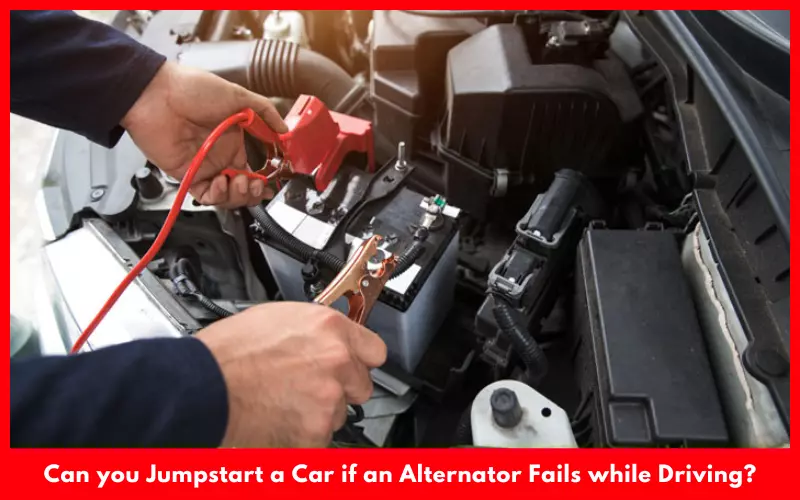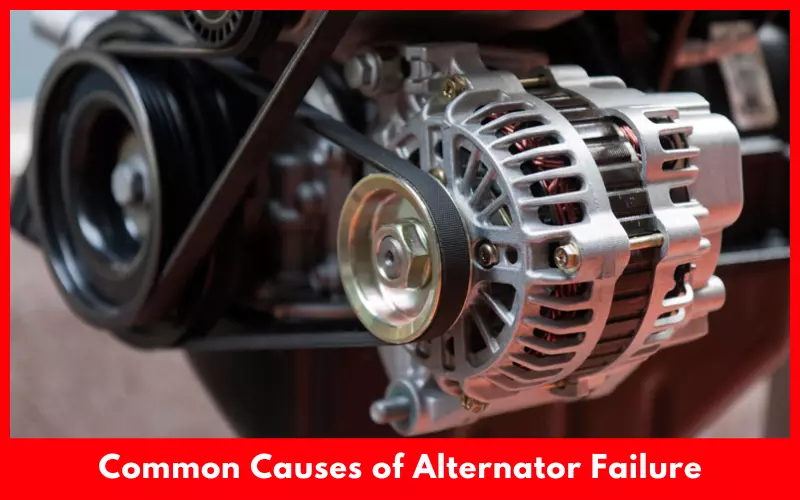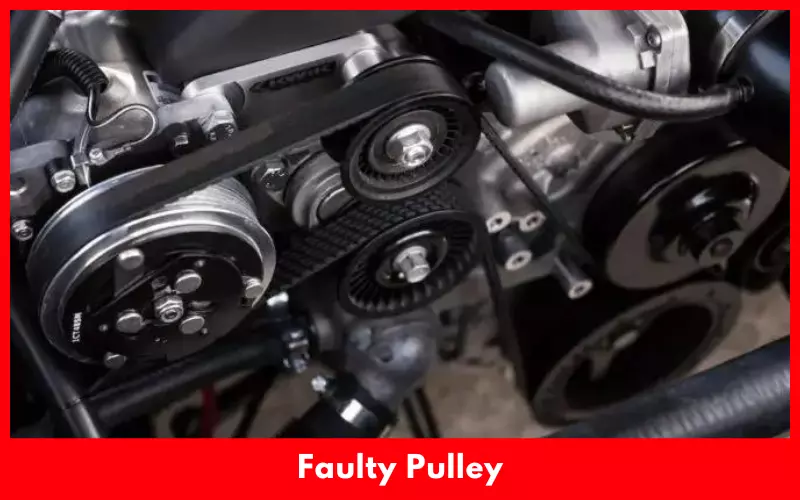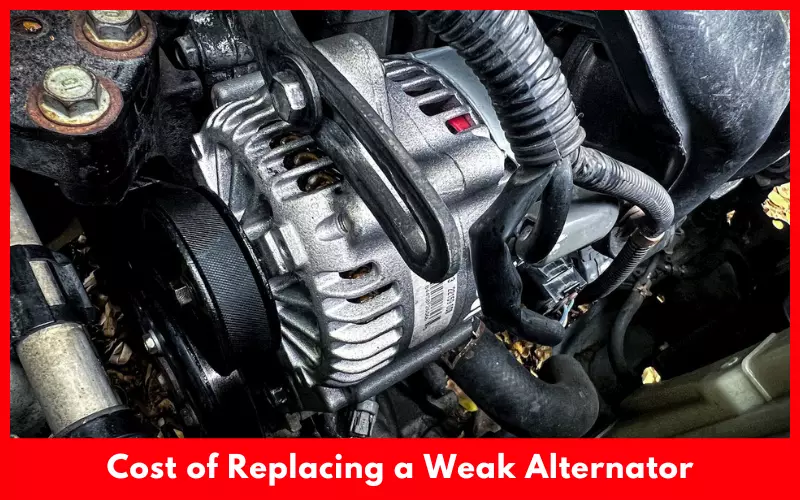The alternator is an integral part of a vehicle that controls the performance of its battery, electric devices, and the engine’s components. If an alternator becomes weak or damaged, your car will experience several issues like engine shaking, rough idle, and dead battery.
However, can a weak alternator cause poor engine performance? Yes, a weak battery disturbs the consistent current flow at a certain voltage to the various engine’s components which can reduce its performance. The alternator becomes weak due to dirt build-up, a loose belt, or worn bearing and shows symptoms like dimming headlights, noise, or rough running.
Article Summary
- Can A Weak Alternator Cause Poor Engine Performance?
- Can A Faulty Alternator Cause Engine Shake?
- Can A Bad Alternator Cause Rough Idle?
- Can You Jumpstart A Car if an Alternator Fails while Driving?
- Common Causes of Alternator Failure
- Signs of Weak Alternator in a Car
- Can you still operate your Car with a Weak Alternator?
- Cost of Replacing A Weak Alternator
- FAQs
Can A Weak Alternator Cause Poor Engine Performance?
Cars usually have 12V acid lead battery which ranges from 10.8 to 12.9V. The alternator provides a charging voltage of up to 14.4V when the engine is working. Once the battery is charged, it can easily achieve up to 13.6 voltages and the current flow also remains minimal.
In this case, the alternator works with low mechanical resistance. But when the battery isn’t charged, the alternator works harder to provide a higher current and make the engine stronger. If an alternator becomes weak, the battery takes a long time to charge. The alternator also needs to work all the time on higher resistance and might not be able to charge the car’s battery completely.
So your car’s electric components won’t work properly and can malfunction. A weak battery can’t also deliver sufficient horsepower that requires for faster driving. If you mean weak alternators such as broken alternators, damaged bearings, or dirt inside, these can cause belt failure, engine misfire, and higher fuel usage.
Overall, a damaged alternator lowers the engine and car’s performance. Too strong an alternator can also cause poor engine performance as it can damage the battery quickly by overloading it.
Can A Faulty Alternator Cause Engine Shake?
A bad alternator can bring several issues including vibration under the hood and difficulty in starting the engine. If an alternator can’t produce enough electricity to ignite the spark plug during starting the car may start shaking. This is because the engine’s components can’t run smoothly without adequate electric power.

You may also need to try multiple times to start the engine while the engine can stop or stall suddenly after starting. Though car engine shaking is a common consequence of bad alternators, it can also cause due to other issues. For example, damaged spark plugs, broken fuel intake, or loose hoses. So if your car shakes during starting, check the other engine components including the alternator.
The car engines can also shake due to the ungrounded alternator as it can interrupt the crankshaft sensor and smooth the firing cycle of the engine. So the RPM can increase quickly which can end up with shaking the vehicle. The Intermittent grounding of the alternator can occur due to frayed wires, loose connections, or damaged terminals.
Can A Bad Alternator Cause Rough Idle?
After starting the engine on battery power, the alternator takes over and helps provide electricity to the entire car. However, it can’t help if the power requirement beat the alternator output.

If an alternator doesn’t put out proper power, the electric components of the car will starve for current. The injectors, sparkplugs, and other devices won’t get enough current to work perfectly. It can end up causing an engine misfire and rough idle.
Can You Jumpstart A Car if an Alternator Fails while Driving?
If an alternator fails while driving the car, the engine and other components that are running on the vehicle will drain the battery. Finally, the engine will quit running. Though you can jump-start to rescue from this situation, as soon as you remove the jumper cables, the engine will stop again. In the worse case, the engine will die and cause a severe accident.

Your car should show a warning light if the battery becomes weak due to alternator failure. To troubleshoot, use an analog meter to check the battery.
If alternator is putting out around 13.6 to 14.5 volts to keep the battery charged, nothing to worry about. If not, take your car to the nearest auto repair shop to diagnose and repair the battery and alternator if required. A weak or shorted battery can also burn out the alternator.
Common Causes of Alternator Failure
Alternators can become weak due to plenty of reasons that can reduce the car’s engine performance. Below are the most common reasons:

1. Dirty Alternator
Dirt in the alternator reduces its efficiency and the vehicle’s power steering. A dirty alternator overheats quickly and reduces the engine’s power.
2. Loose Belt
An alternator can rotate faster than usual due to its loose belt. It can reduce the engine power and hurt the fuel economy.
3. Worn Bearings
The bearing helps an alternator rotate smoothly. Worn bearing forces an alternator to work harder which overheats the alternator and leads to failure.

4. Faulty Pulley
The pulley help transfers engine power to the pulley. A faulty or damaged pulley can also damage the alternator.

5. Electrical Problem
The alternator can also overheat and damage due to electrical problems in the car. If there are loose wires, inconsistent voltage, faulty connection, or a bad battery, the alternator can fail.
Signs of Weak Alternator in a Car
Apart from the poor engine performance, you can experience these warning signs if an alternator of your car becomes weak:
Dimming Headlights
A healthy alternator keeps the headlight bright following the speed of the engine. Flickering or dimming car headlight is an obvious indicator of a weak alternator. Noticing this sign means the alternator can’t provide adequate electricity to the car’s electric system. If so, the headlight should lighten and dim along with increasing and decreasing the engine’s speed.

Slowing Down Electrical Components
Electrical accessories like clocks, windows, and seats depend on a consistent current supply. A weak alternator can slow down the performance of these electric components.

Drain Battery
The alternator keeps the car battery fully charged all the time. The battery uses some charge to start the engine that is recharged by the alternator after running the engine. A weak alternator can’t keep the battery completely charged which can result in a tough start.
Noise
If you hear a howling, grinding, or squealing noise from the car’s alternator, the wheel bearing might have failed. It can damage the whole alternator if you keep driving in this condition.
Rough Running
Today’s vehicle needs a specific voltage’s consistent current to run smoothly. The fuel system, ignition system, emission system, and engine computer depend on the current provided by the alternator.

A weak alternator can introduce these components to malfunction and the engine’s rough running. The other signs include engine misfire, rough idle, poor acceleration, and car stalling.
Can you still operate your Car with a Weak Alternator?
Technically you can keep driving your car with a weak alternator, it isn’t recommended particularly if you have a newer model. Today’s vehicle depends on electricity more than the older model. Keeping driving with a bad alternator may provide you with a few more miles; it can damage the battery performance or introduce various electrical issues.
However, the exact miles you can drive depend on the amount of power the battery has, the number of accessories running in the car, and the driving conditions. The worse consequence is that today’s vehicle has electricity-operated power steering. A weak alternator can make it hard to control the steering.
It can be extremely risky on highways, particularly for inexperienced drivers or driving in curve areas. Keeping driving with a weak alternator can also drain the battery completely and can reduce its longevity. If an alternator fails and the battery charge drains completely while driving, your car can stall and you may trap in traffic.
So if you notice any of the signs of a weak alternator, replace the alternator at a service center as soon as possible.
Cost of Replacing A Weak Alternator
Replacing a weak alternator can cost around $600 to $1000 or even more depending on the parts price. If you purchase all the parts and equipment required for replacement, still the mechanic will cost around $600. Replacing an alternator takes one to three hours and expert mechanics can charge $100 to $200 per hour.

However, you can save this bulk of money and get satisfaction by replacing the alternator on your own. Working on your car is a fun challenge; improves skill and a sense of pleasure. But if you aren’t confident enough and take the aid of an expert mechanic, you can visit the local AutoZone.
FAQs
Can a bad alternator cause transmission problems?
A bad alternator can’t charge a battery fully and prevent the computer from shifting the transmission gears properly. It can also cause stalling or rough shifts. The weak alternator can lead the engine and transmission failure mode and make driving challenging.
Can a bad alternator cause ac problems?
A faulty alternator prevents electric devices from getting enough power to function properly. if there is any problem with the alternator, the car’s air conditioning, windows, power locks, and internal lighting can become weaker or work slowly.
Can a bad alternator cause false codes?
Several sensors of a vehicle depend on the alternator to get proper information. Sensors can show false error codes if their working process is disturbed due to a faulty alternator. A bad alternator can also lead your vehicle to limp mode.
Final Words
The alternator provides consistent power at a certain voltage to the engine’s components so they can work properly. A weak or damaged alternator hurt the engine in plenty of ways and reduces its performance.
Overall a weak alternator can bring poor engine performance and make driving the car hazardous. So if you notice any of the signs of a weak alternator, repair or replace it to keep the engine’s components and electrical device in optimum condition.

